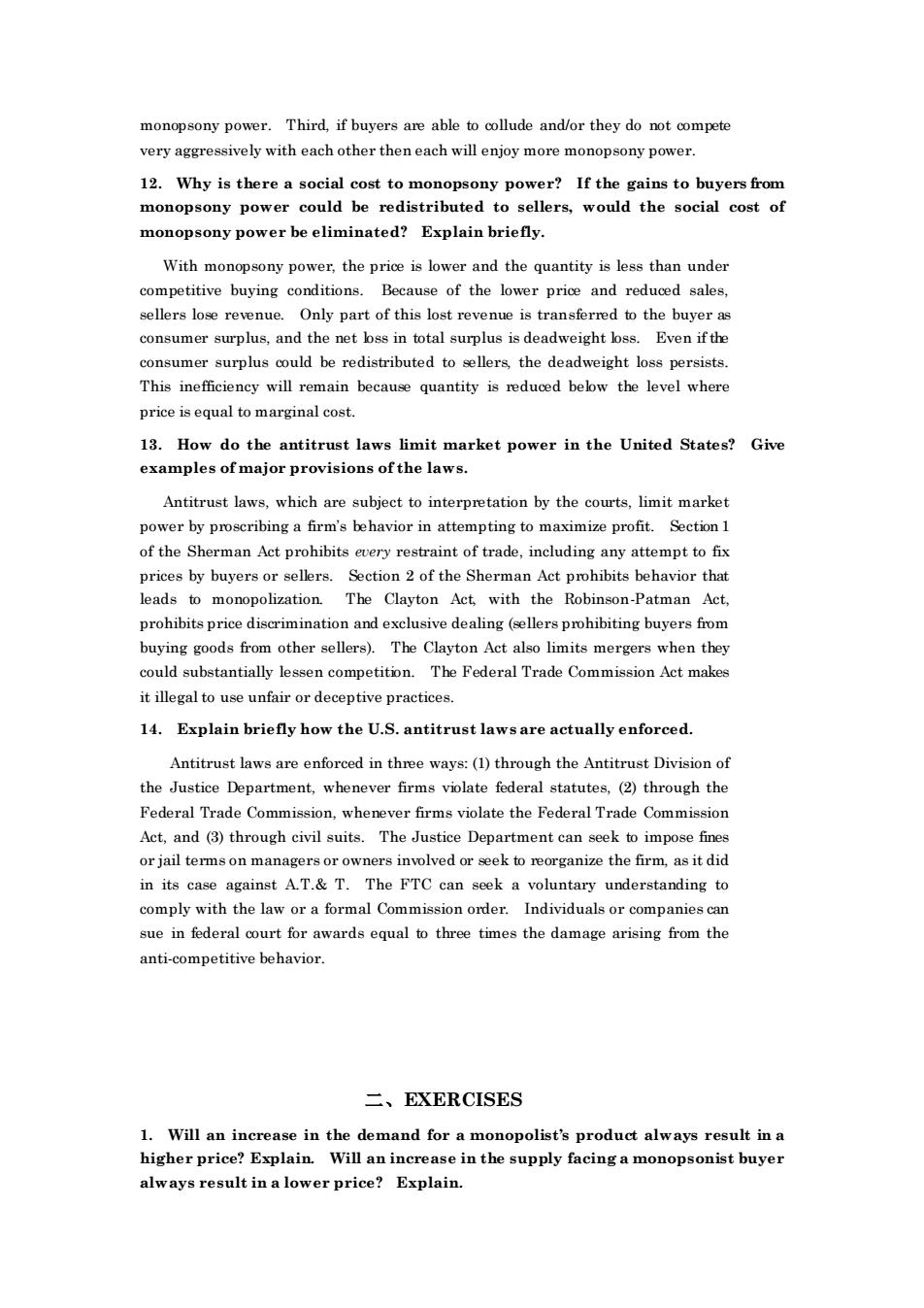正在加载图片...

monopsony power.Third,if buyers are able to collude and/or they do not compete very aggressively with each other then each will enjoy more monopsony power ony power?If the gains to buy yers from e social cost of monopsony power be eliminated?Explain briefly. With monopsony power,the price is lower and the quantity is less than under competitive buying conditions.Because of the lower price and reduced sales. sellers lose revenue.Only part of this lost revenue is transferred to the buver as consumer surplus weight ss persists This inefficiency will remain because quantity is reduced bebw the level where price is equal to marginal cost. 13.How do the antitrust laws limit market power in the United States?Give examples ofmajor provisions ofthe laws. Antitrust laws.which are subject to interpretation by the courts.limit market ower by poribngafirm'behavior in attempting to of the Sherman Act of trade,including any attempt tofi prices by buyers or sellers.Section 2 of the Sherman Act prohibits behavior that leads to monopolization.The Clayton Act.with the Robinson-Patman Act. prohibits price discrimination and exelusive dealing(sellers prohibiting buyers from buying goods from other sellers).The Clayton Act also limits merge s when they .The Federal Trade Act make it illegal to use unfair or deceptive practices. 14.Explain briefly how the U.S.antitrust lawsare actually enforced Antitrust laws are enforced in three ways:(1)through the Antitrust Divisiono the Justice Department,whenever firms violate federal statutes,(2)through the Federal Trade Commission.whenever firms violate the Federal Trade Commission Act,and (3)through civil suits.The Justice Department can seek to impose fines or jail tem eek to ni e the fir as it did n its case against A.T.&T.The FTC can seek a voluntary understanding to comply with the law or a formal Commission order.Individuals or companies can sue in federal court for awards equal to three times the damage arising from the anti-competitive behavior. 二、EXERCISES 1.Will an increase in the demand for a monopolist's product always result in a higher price?Explain.Will anincrease in the supply facinga mon sonist buyer always result in a lower price?Explain monopsony power. Third, if buyers are able to collude and/or they do not compete very aggressively with each other then each will enjoy more monopsony power. 12. Why is there a social cost to monopsony power? If the gains to buyers from monopsony power could be redistributed to sellers, would the social cost of monopsony power be eliminated? Explain briefly. With monopsony power, the price is lower and the quantity is less than under competitive buying conditions. Because of the lower price and reduced sales, sellers lose revenue. Only part of this lost revenue is transferred to the buyer as consumer surplus, and the net loss in total surplus is deadweight loss. Even if the consumer surplus could be redistributed to sellers, the deadweight loss persists. This inefficiency will remain because quantity is reduced below the level where price is equal to marginal cost. 13. How do the antitrust laws limit market power in the United States? Give examples of major provisions of the laws. Antitrust laws, which are subject to interpretation by the courts, limit market power by proscribing a firm’s behavior in attempting to maximize profit. Section 1 of the Sherman Act prohibits every restraint of trade, including any attempt to fix prices by buyers or sellers. Section 2 of the Sherman Act prohibits behavior that leads to monopolization. The Clayton Act, with the Robinson-Patman Act, prohibits price discrimination and exclusive dealing (sellers prohibiting buyers from buying goods from other sellers). The Clayton Act also limits mergers when they could substantially lessen competition. The Federal Trade Commission Act makes it illegal to use unfair or deceptive practices. 14. Explain briefly how the U.S. antitrust laws are actually enforced. Antitrust laws are enforced in three ways: (1) through the Antitrust Division of the Justice Department, whenever firms violate federal statutes, (2) through the Federal Trade Commission, whenever firms violate the Federal Trade Commission Act, and (3) through civil suits. The Justice Department can seek to impose fines or jail terms on managers or owners involved or seek to reorganize the firm, as it did in its case against A.T.& T. The FTC can seek a voluntary understanding to comply with the law or a formal Commission order. Individuals or companies can sue in federal court for awards equal to three times the damage arising from the anti-competitive behavior. 二、EXERCISES 1. Will an increase in the demand for a monopolist’s product always result in a higher price? Explain. Will an increase in the supply facing a monopsonist buyer always result in a lower price? Explain